Lent II A Being Born Anew
We have plenty of scary things going on in the world lately. The demonstrations in the middle east that have sometimes turned violent, are cause both for concern and hope that leaders will give their people more freedom and act to repair problems and treat all classes fairly. These problems seem to be made by people—the greed and seeking of power through military force.
Then there is what we usually call natural disaster—hurricane Katrina, which still affects the people of Gulf Coast, the earthquake in Haiti, which keeps that nation under a pall of hunger and distress, and now ten days ago, the earthquake and tsunami in Japan with nuclear power plant explosions and the death of perhaps as many as 10,000 and the displacement of many more Japanese in the areas north of Tokyo.
And here across our states we see legislators struggling to make ends meet, by slashing, of all things, budgets for education and health care.
So, today, as I ponder these events around the globe, I feel a little like Nicodemus. Nicodemus was a scholar of Judaism, a leader of the temple, who comes to Jesus in the night asking questions. Someone has said Nicodemus goes from having all the answers to having all the questions. He acknowledges that Jesus’s power is from God, but when Jesus says anyone can have the power of God by being born from above, he skeptically asks how one can be born from his mother again?
When I see the crises of the world, I see both the sins of people and the power of creation. In the middle east and here I see how we have squandered our inheritance, made bad choices in how we care for each other, and do not take responsibility for the core issues like people’s right to dignity, the need for quality education and accessible health care.
In the so-called natural disasters, I see where we have engineered our way into the path of destruction of waves and fault lines. In the Mississippi River valley, we have built so many levees and been engineered so much that the river no longer meanders like rivers were meant to do, so it breaks the levees and washes away houses and lives that have thought they were safe behind the levee. We have the sense that we can control the power of creation.
Whether is it people and money or the natural forces of wind, earth, fire and water, we want control. We ask that our leaders do not surprise us, that our day not be interrupted by rain, sleet or snow, high wind, flood or earthquake, and like Nicodemus we do not understand how God is asking us to rely on the love and security that only God can give.
It’s a condundrum to be sure. God has given us the minds and technological know-how to be seemingly safe and secure, on the one hand, and on the other hand, we must ask how we have abused this gift of knowledge and technology and used it to control people and reduce the earth’s quality and ultimately the quality of our lives? How has people power displaced the trust in an all-loving God of creation?
Jesus tells Nicodemus that God so loved the world that he gave his Son, so that everyone who believes in him may not perish but have eternal life. Eternal life means life here and now, not life later in heaven. Eternal life means abundance for all whom God loves, not just the people we think should be loved. Jesus is stating that we have all we need now from God, all we need to do is say yes with outstretched hands.
We see this kind of trusting response to God in Abraham whom God leads into a new land, away from all he knows, the comfort of friends and family and the shelter of house and security of all he owns.
How are we being asked to leave security and comfort and go to a new place? How has the strife and disaster of our world and in our local states challenging you to rethink yourself as a link in our technologically secure world that masks the real lack of security we ultimately have? Where is God in your daily life as you go along not thinking about the many ways you participate in pushing God away?
The writer Parker Palmer calls our wanting control and feeling responsible for everything that happens to us as “functional atheism”. In other words, whenever we feel we have everything under our thumb, look out. God may be trying to help us understand how very much we need the guiding love and gift of God’s presence. To acknowledge this dependence on God is to be born anew. Just like Nicodemus, we bring our questions, and are told that God so loved the world, so loved us that all we need to do is say yes.
Saying yes to God makes us compassionate, so that when we see the disasters around us, we cry, but instead of seeing our technology and our power as the response, we can begin to see God’s creative power as the answer. Instead of blaming each other, we can pray that God help us to make the world the place of God’s kingdom, not ours.
Subscribe to:
Post Comments (Atom)


No comments:
Post a Comment